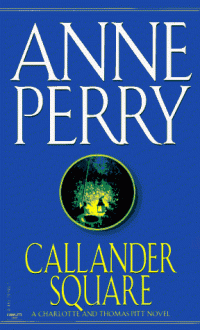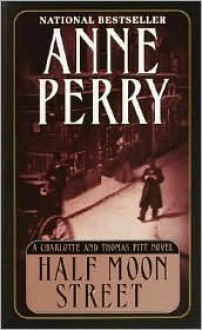
Thomas Pitt, a policeman, has been married to his well-born wife, Charlotte, for a relatively short amount of time. Charlotte is pregnant and quite happy with her marriage - she doesn't mind that she and Thomas don't have much money, or that she has to do housework. But that doesn't keep her from meddling in Thomas's work a bit.
Thomas's latest case involves the discovery of two dead infants buried in a wealthy neighborhood. There's no way to tell whether they were stillborn or murdered, although the one that's been dead the longest shows signs of deformities. It's a delicate case: the mother (or mothers?) likely worked or is still working for one of the nearby families. As Thomas questions the various servants, Charlotte and her sister Emily become involved as well.
I haven't read the first book in this series, but it didn't seem to interfere with my enjoyment much. I picked this up during a recent used book shopping trip, due to a recommendation in a comment on a Smart Bitches, Trashy Books post asking for historical romance recommendations involving working class couples. Unfortunately, the first book wasn't available, or I'd have started with that one.
The blog comment indicated that the books were mysteries with romantic elements, which I can sort of see but which set up expectations that Callander Square, at least, didn't fulfill. For example, while Thomas and Charlotte clearly loved each other, they didn't actually spend much on-page time together. I went into this book expecting Charlotte to give Thomas information more regularly than she did. I can't recall if she ever even admitted to Thomas that the "friend" she'd begun helping was actually General Balantyne, who might have had some connection, direct or indirect, to the dead babies. The number of sections from Emily's POV also surprised me.
Also, I didn't remember until after I started reading this that Anne Perry is the mystery author who, when she was 15, participated in the murder of her friend's mother. I'd always previously avoided her books because of that - reading murder mysteries written by someone who has actually committed one seemed...icky. On the plus side, at least there were no explicit on-page murders or "killer POV" scenes.
Anyway, back to the book itself. I really liked the beginning but started to become impatient as I got further in and there seemed to be no progress in the case. True, there were potential scandals galore (exciting!), but if it hadn't been for one particular murder, I doubt the mystery of the buried babies would have ever been solved. One very important detail didn't even come up until the last ten pages or so.
I really wish the book had included a character list/guide, or possibly a set of family trees, because keeping all the names straight was difficult. For a while there, I had a theory about the murderer's identity that involved one character's father, but I couldn't for the life of me remember if his name had ever been mentioned. It didn't help that some of the characters had relatively similar names and/or didn't get mentioned much. I kept on mixing up Carlton and Campbell, for example. And even if I remembered who the characters were and why they were important, I couldn't always remember who their spouses and children were.
Still, I enjoyed all of the various intertwined scandals and was surprised (in a good way?) that things actually worked out fairly well for several of the families, considering. The original mystery, the issue of what happened to the two dead babies, didn't grab me as much, maybe because it tended to be overshadowed by everything else.
One of my favorite things about this book was the way it handled its various female characters. Perry included a whole range of female characters, from annoying and silly to ruthlessly pragmatic. I liked some without reservation, disliked others, and found myself grudgingly respecting a few that I initially thought I'd 100% hate. The one thing nearly all of them had in common was that the men around them underestimated their perceptiveness and the depth of private lives and feelings. Even Thomas occasionally made this mistake, although he was good about listening to and learning from Charlotte, and was never so badly shaken by what he learned as some of the other men.
This was a bit slow for my tastes and didn't have Charlotte and Thomas on-page together as much as I'd expected, but I did enjoy it and plan on reading the next book at some point. I might also go back and read the first one, just to see what I missed.
(Original review posted on A Library Girl's Familiar Diversions.)

 Log in with Facebook
Log in with Facebook 







